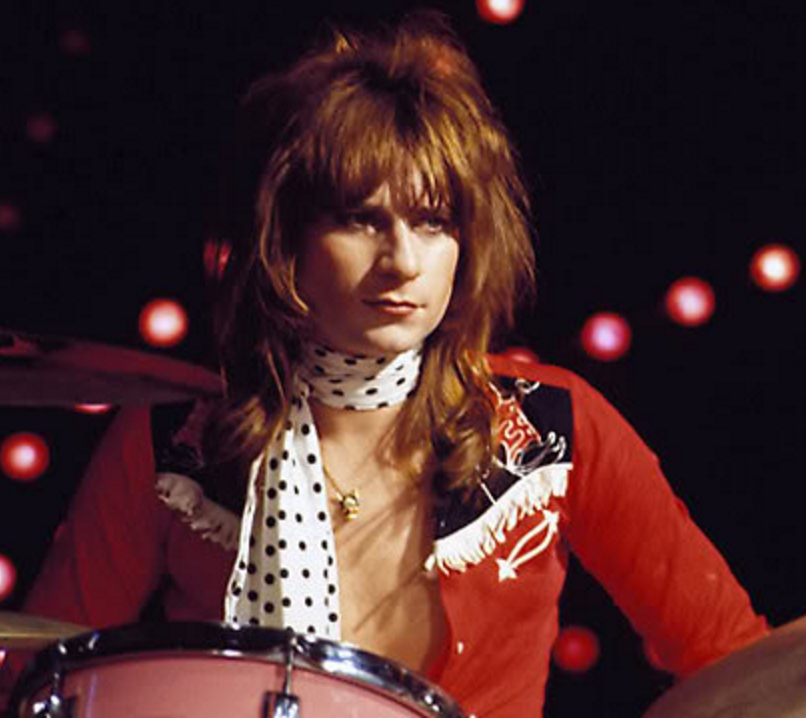Telling the tempestuous and tragically short life story of ex-New York Dolls and Heartbreakers drummer Jerry Nolan was always going to be a formidable challenge. American author Curt Weiss has succeeded with "Stranded in The Jungle. Jerry Nolan’s Wild Ride", the unvarnished biography of one of New York rock and roll's most mercurial figures.
It's an account of a man whose flaws were seemingly as large as his talents. Nolan was the pre-eminent rock and roll drummer of his era but his life was scarred by drug addiction. His death at 45 - almost certainly AIDS-related, according to "Stranded In The Jungle" - came hard on the heels of that of his bandmate Johnny Thunders, and closed a time in NYC that we won't see again. The book's theme is that Nolan's playing skills and style were admirable; his addiciton and treatment of others much less so.
Weiss' book takes us through the underbelly of rock and roll on a trail littered by used syringes, stymied ambition and squandered opportunities. Importantly though, "Stranded in The Jungle" makes the place of the Dolls in punk rock's continuum crystal clear. And is impossible to put down.
Curt Weiss consented to talk about his book from his Seattle home. Here's the lowdown.
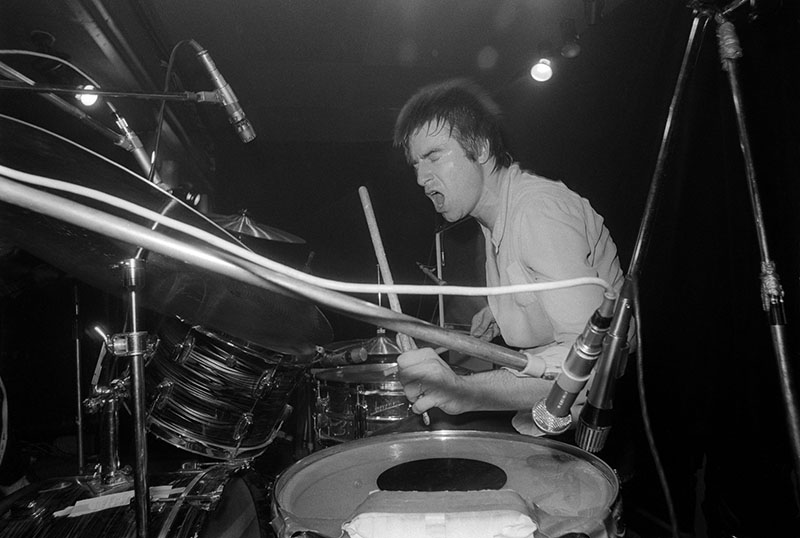 Jerry in full flight with Johnny Thunders and the Heartbreakers. Ray Stevenson photo.
Jerry in full flight with Johnny Thunders and the Heartbreakers. Ray Stevenson photo.
What was the catalyst for writing a book about Jerry Nolan? I know you’d met him in passing but what actually prompted you to dive into a book about his life years later?
I felt he was an under-appreciated and impactful figure of the great ‘70s glam and punk scenes, both in the states and Europe. But despite there being books on the Dolls, Thunders, Arthur’s posthumous memoir, and many stories related to Jerry and his bands in other books, his story had never been fully told.
Even the Village Voice piece from July of ’91, as great as it was, was only a sliver of his life and history. Other catalysts for me were seeing the Dolls reunite back in '04, and the documentary on Arthur “NY Doll”, which came out in 2005.
As far as I could see, there was now renewed interest in all things related to the Dolls. But I also felt that drummers were often taken for granted, and I wanted to help right that wrong. Drummers can define bands as much as any member, and so it was with Jerry. He helped create the sound of every band he ever played with. So when I put all of that together, it made sense for there to be a book on Jerry. I just didn’t think it would take as long as it did.
Talk about the process and time involved.
Back in ’06 I started contacting people who were somehow related to Jerry so I could interview them. Managers, bandmates, lovers, friends and family. Anyone that knew him, even if it was for just a brief moment in time. They often led me to even more people, like Suzi Quatro suggesting I talk to her sister Patti, who had great insights into Jerry.
I sought out articles about bands he was in, as well as any previous books that mentioned him, his bands, or the surrounding times and places. I also contacted his old school districts, the Veterans Administration, even the Library of Congress to find background information like school yearbook photos, old addresses, army bases his step father was stationed at, etc. I looked through old phone books in New York, as well as museum video archives. I even went to Sweden and dove through old storage units that his ex-wife had.
As I was doing this, I started to string together all of this material into an oral history. That was close to 700 pages by the time I finished it. It proved to be a great outline for the final manuscript.
In 2013, I started to write a proposal and by the time that was done, and I had honed a few chapters down, I started contacting agents I’d met at a writer’s conference who had shown some interest. The one I ended up with was attracted to the book because he’d been a Replacements fan, and he knew that they were big Johnny Thunders fans, so he at least had some sense of what I was going on about.
We first tried selling it as an oral history but had no takers. He told me to either turn it into a narrative or give it up. After writing a chapter, we re-wrote the proposal and got a commitment from Backbeat in August 2015. I handed in my first manuscript in September of 2016. A few zillions edits later and voila! The rest is history.
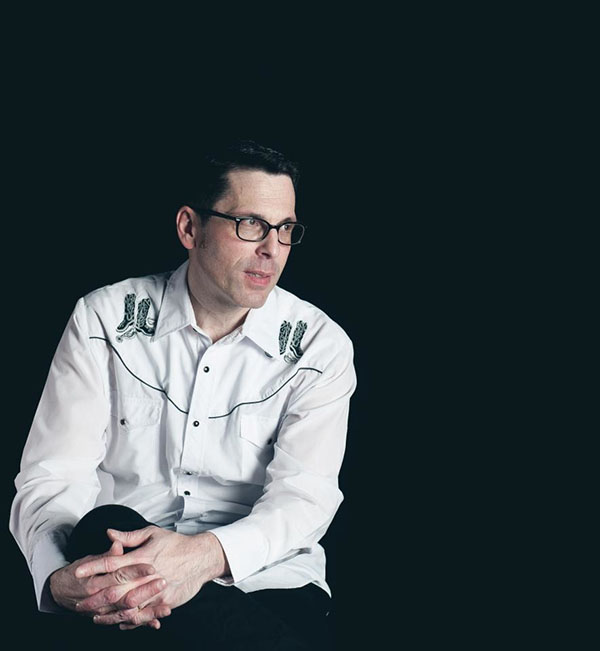 Kurt Weiss. Ernie Sapiro photo.
Kurt Weiss. Ernie Sapiro photo.
What’s reaction been? It doesn’t pull punches so has that been an issue for many people?
Most of the reviews have recognized that and have looked at it favourably, although there were a few who got swept up in the whisper campaign. But I didn’t see any point in perpetuating myths or telling people what they already thought they knew about Jerry.
Jerry was a very flawed man. He could be a wonderful, loyal, friendly, funny, insightful, sweet, and charming guy. But he also stole money, beat women, and said racist or homophobic things. I can’t defend any of that. But much of that was pretty much the norm for people of his background in the time and place he grew up in. Most reasonable people, when looking back on their lives, regret some of things they may have done when they were younger. But most try to rectify things as we grow older and wiser. Few of us are the same person at 58 as we were at 18.
But drugs can stilt your emotional development. Jerry was uneducated, an addict at 28 and had what was a highly stigmatized, seemingly terminal illness at 39. His upbringing, giving up his child for adoption, his professional struggles before the Dolls, and the demise of the Dolls, permanently damaged him. He never really got the help he needed, and thus became an addict. He never acquired the tools to change. Well adjusted, happy and healthy people don’t become addicts. There’s always trauma with addicts.
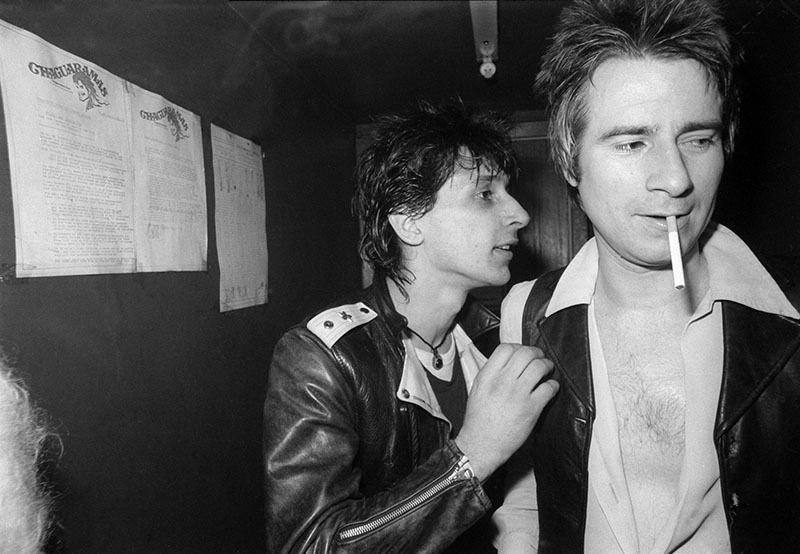 Johnny Thunders and Jerry Nolan on tour in the UK. Ray Stevnson photo.
Johnny Thunders and Jerry Nolan on tour in the UK. Ray Stevnson photo.
Jerry’s late mother Charlotte seems to have been a key interviewee. How did that come about and how did you find her?
I don’t remember which ex-girlfriend gave me his mother’s contact info but I had two conversations with her that were unforgettable. She was 92 at the time and a throwback to a New York that doesn’t seem to exist anymore. She loved to talk and tell stories, particularly about Jerry. It was obvious that Jerry was her favourite, and I always assumed that was because he never really had a father, while the other two kids did. She would do anything for him.
She died about a year after I spoke with her. It’s a cliché to say “‘They don’t make them like that anymore’, but with her, its 100 percent true.
What assistance did New York Dolls and Johnny Thuinders biographer Nina Antonia give? There was a suggestion online that she pulled back.
I must have exchanged a dozen or more e-mails with Nina, as well as a phone interview I did with her in July of ’06. She also got a copy of the transcript soon afterwards. I sent her a bunch of Johnny Thunders bootleg DVDs and she sent me a number of her articles where she had interviewed Jerry. She was very encouraging at that time.
When the book was still an oral history I sent her two chapters to look at which covered 1978-80. Those were years when his addiction was running on all cylinders. The chapters weren’t what she had hoped it would be and she was quite cool to me after that. I guess she was looking for a story about a noble hero, and too often, that wasn’t the case. As you said, I didn’t pull any punches.
I learned a number of things about addicts and those surrounding them while writing this book. First, inherently the addiction comes first, so they’ll do whatever they have to do to meet that need. That means they will use anyone: family, friends, lovers, anyone. Second, addicts manipulate and compartmentalize the people in their life. Some don’t get involved in their addictions but may inadvertently become enablers; others are full on partners in crime. And the lies just flow like water. They don’t see the same side of the addict that others might.
Subsequently when people who knew Jerry read the book, sometimes their response is, “This can’t be true,” and they choose to lash out at me. In reality, they just can’t admit to themselves that they were used by Jerry and didn’t know him as well as they thought they did, and that’s because almost no one did. Probably the only people that experienced anything close to the real Jerry Nolan was his ex-wife Charlotte and Johnny Thunders.
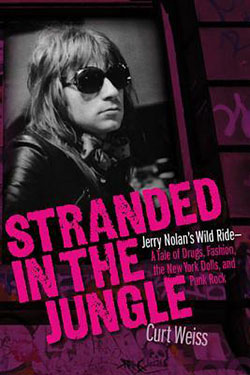 Is there an interviewee that you regret not talking to? I’m thinking Jerry’s childhood friend and KISS drummer Peter Criss or his last live-in partner, Phyllis Stein? What are the back stories there?
Is there an interviewee that you regret not talking to? I’m thinking Jerry’s childhood friend and KISS drummer Peter Criss or his last live-in partner, Phyllis Stein? What are the back stories there?
I would have loved to speak to Bette Midler (an Nolan ex-girliriend), but the most I got was a response from someone in her management company saying she was too busy. Someone gave me Steve Jones’s phone number and I called him. To my surprise he answered. I politely asked if I could interview him for the book, and he politely declined.
I would have loved to talk to Paul Cook as he’s a drummer, and so much of his drumming style comes from Nolan. But I couldn’t get to first base on that one. I spoke with John Lydon’s manager/handler a few times. At first John was going to do it and then he just became accusatory and threatening.
Paul Simenon: nada. I tracked down Mick Jones outside of a Carbon Silicon show. That was his band with Tony James in the mid 2000’s. His answer to every questions was, “I can’t remember.” Danny Secunda stopped returning my e-mails after initially sounding interested.
I ran into Debbie Harry at Leee Childers’ memorial and introduced myself to her. We share some close friends so I was at least able to break the ice. I didn’t think a memorial was the place to strong-arm her for an interview. But we did have a short conversation about Jerry and shared a laugh or two. But any efforts with her publicists for a full interview went nowhere.
As for Peter Criss, I met him at an autograph show and he said he’d agree to an interview. He never came through. I think he just doesn’t want to talk about Jerry in an uncontrolled environment. His book was his controlled environment.
Journalists like Seymour Hirsch, who investigate government cover-ups, strong arm people to get them to go on the record. I’m more of a lighter touch guy. But there’s plenty of people I spoke to off the record. I had some “Deep Throats” that would surprise you. And plenty of people who spoke on the record also made comments on background.
Your book doesn’t paint a flattering picture of Jerry in terms of how he dealt with other people in his life. Was it hard to be so direct about a musician whose musical skills you obviously held in high regard?
I saw John Cooper Clarke recently and got to talk to him and give him a book. He immediately said, “Jerry was so sweet.” Despite all that went on in his life, he could be a great friend and there were people who really loved him. It’s all throughout the book, particularly in the testimonials near the end.
Still, I can’t deny that many of things I discovered about him disappointed me greatly, but my job wasn’t to only write about the nice stuff. My job was to find out as much of the truth as possible, good, bad, or otherwise. But if you put all of the drugs, and boorish behaviour to the side for a moment, the book is filled with a lot of detail about style, New York history and culture, relationships, struggle, regret, abandonment, and of course music.
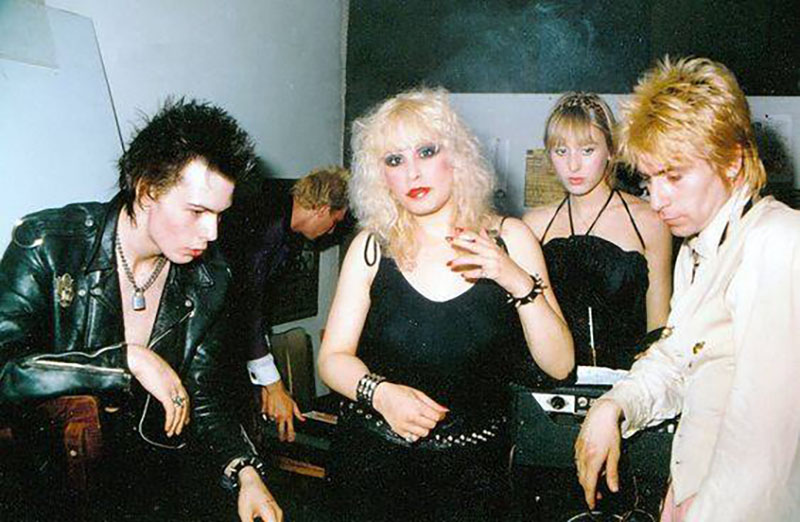 Sid, Nancy and Jerry backstage at Max's Kansas City in 1978. That's Arthur Kane from the NY Dolls at the rear left.
Sid, Nancy and Jerry backstage at Max's Kansas City in 1978. That's Arthur Kane from the NY Dolls at the rear left.
I don’t think there’s any book about punk that examines a player’s musicianship in as much depth and detail as “Stranded In The Jungle” does. But I felt I had to paint as accurate a picture of him as possible, or it wouldn’t have been credible. He did all of those things and more.
In retrospect I think some of it is so shocking to people that they don’t quite remember those other things the first time around. I guess I’m recommending that everyone read it twice. I surely won’t complain if people buy it twice.
Is the book title a metaphor for Jerry Nolan’s life?
Very much so. Jerry’s story is tragic: all of his bands imploded under a cloud of drug abuse, and afterwards others capitalized on their pioneering work. That would scar anyone. The abandonments and failures, the deaths of Sid and Johnny, all hurt him deeply. Plus his death at 45 was heartbreaking.
Jerry’s sense of style is a recurring theme. Was seeing Elvis the primary source for that or did he have other influences?
I think seeing street gangs in Brooklyn when he was an adolescent was just as impactful. Every gang had their own look, and had commanding presence. They did what parents said not to do, which kids love. They must have seemed larger than life to him…just like rock and rollers.
But I also think it’s worthwhile to remember what the great fashion photographer Bill Cunningham said: “Fashion is the armour to survive the reality of everyday life.” Jerry needed armour.
Gene Krupa seems the big influence on his playing. As a drummer yourself, how do you sum up Jerry’s style?
It’s minimal but creative. It’s very deliberate. He’s never just winging it. But still, if you ever saw him live, he could re-think his parts, and like a jazz player, come up with something completely different and beautiful and perfect in its own way. Also like a jazz player, he had swing, that comfortable hop or skip in his feel. And like a big band jazz player, he propelled and drove a band. Seeing him play was always a pleasure.
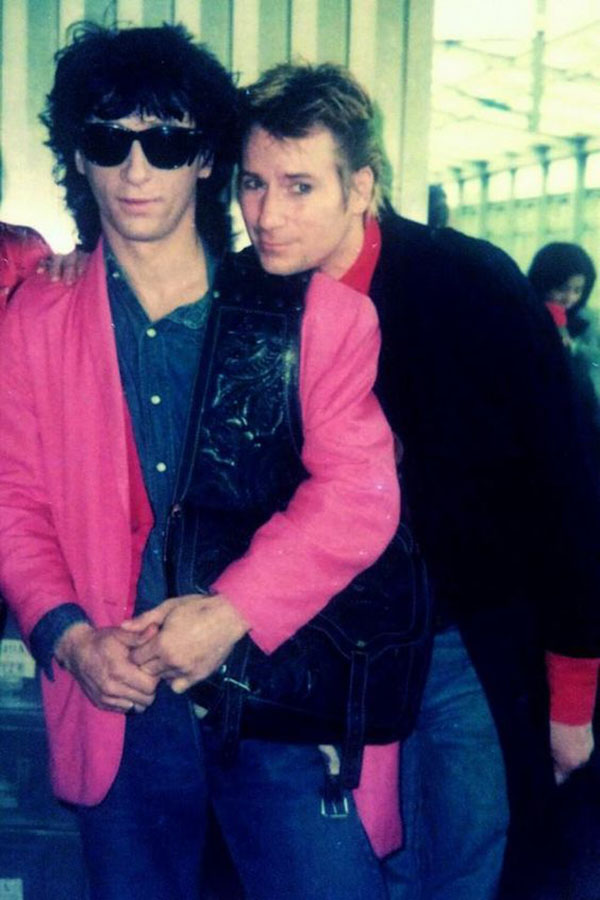
Johnny and Jerry on tour in the late 1980s.
One of the things that “Stranded In The Jungle” does very well is contextualise the place that the New York Dolls in particular had in the local music scene and ultimately on the pathway to punk rock. Was that something you set out to do?
I very much wanted to make the argument to the reader of the importance of the Dolls. As much as the Velvet Underground, if not more so, they were the great catalyst of the NY punk scene.
Every one of those early CBGB bands like Television, the Ramones, Blondie, and Talking Heads, took something, either directly or indirectly, from the Dolls. They had just as big of an impact on the first wave of British punk, and were in the record collections of most second wave punk, and indie rock groups, both in the states and Europe, throughout the ‘80s.
Plus you can see them in Twisted Sister and Motley Crüe, the “Hair Metal” bands of the late 80s like Poison, and even Guns and Roses. Outside of Marc Bolan and T Rex, there’s probably no artist as influential from ’72 through ’92 who’s not in the Rock and Roll Hall of Fame.
Could the Dolls have sprung from anywhere else but New York City?
I don’t think so. The combination of Warhol, street gangs, girl groups, R&B, swagger, and humour is totally New York.
How hard would it have been to write a biography like this before social media and the Internet?
I found so many people via social media, and archival materials via the Internet, it would have been impossible.
There’s a part in the afterword where you relate seeing Jerry on the street in NYC the day before you moved to live in Seattle and you couldn’t bring yourself to ask to interview him. How different would your book have been if you had? What triggered his lengthy Village Voice interview?
I’ve wondered about that, but if you assume everything else would have stayed the same, in particular his illness and eventual death, I don’t think much else would have been different. Still, to have a sit down with him over coffee….
As for the Voice interviews, they came from Doug Simmons meeting Jerry and, like me, realizing that he was a really fascinating person with a fascinating story. Doug did a great job. It was not as easy as you might think structuring a series of interviews with Jerry into a coherent story. Doug had his work cut out for him but he got it done. I tip my hat to him.
Since we’re in a bar, what are you drinking?
Club soda. I’m on the wagon.
"Stranded In The Jungle: Jerry Nolan's Wild Ride" by Curt Weiss is on Backbeat Books. Read our review here.

